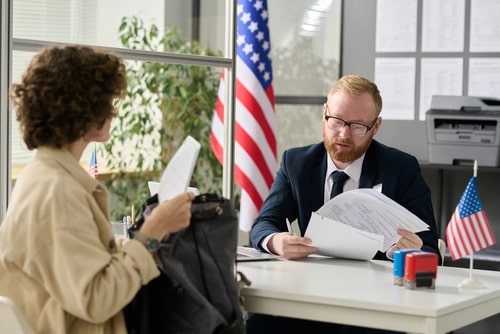What Exactly is Consular Processing?
 When it comes to immigrating to the United States, there are various pathways and processes that individuals must navigate. One such process is consular processing, which is a method of obtaining an immigrant visa through a U.S. embassy or consulate in a foreign country. A Texas lawyer can help you more with the specifics of consular processing and how it applies to your specific case.
When it comes to immigrating to the United States, there are various pathways and processes that individuals must navigate. One such process is consular processing, which is a method of obtaining an immigrant visa through a U.S. embassy or consulate in a foreign country. A Texas lawyer can help you more with the specifics of consular processing and how it applies to your specific case.
What is Consular Processing?
Consular processing is the procedure by which individuals living outside the United States can apply for an immigrant visa to enter and permanently reside in the country. This process is typically initiated by a U.S. citizen or lawful permanent resident who files a petition on behalf of their foreign family member. After U.S. Citizenship and Immigration Services (USCIS) signs off on approval for the petition, it is sent to the National Visa Center (NVC) for additional processing.
What is Involved in the Consular Processing Timeline?
The consular processing timeline can vary depending on various factors, such as the type of visa being sought, the caseload of the U.S. embassy or consulate, and the individual’s background. Generally, after the NVC receives the approved petition, they will send the applicant instructions on completing the necessary forms, paying the required fees, and gathering supporting documents. You must follow these instructions carefully and provide all requested information to avoid delays in the process.
Preparing for the Visa Interview:
Once the National Visa Center (NVC) deems the case interview-ready, they schedule an appointment at the U.S. embassy or consulate in the applicant’s home country. At the interview, a consular officer evaluates the applicant’s eligibility for the immigrant visa, questioning their relationship with the U.S. sponsor, qualifications, and any possible inadmissibility factors. Make sure you always remain honest, transparent, and thoroughly prepared for the interview.
Addressing Inadmissibility Issues
In some cases, individuals may face inadmissibility issues that could hinder their ability to receive an immigrant visa through consular processing. These issues include criminal convictions, prior immigration violations, or certain medical conditions. Under Texas law, individuals with a history of family violence or misdemeanor offenses may face additional scrutiny. However, depending on the specific circumstances, waivers of inadmissibility may be available to overcome these obstacles. Working closely with an immigration attorney in Texas can help you get through these types of difficult situations.
What About After the Visa is Issued?
Once the consular officer determines that the applicant is eligible for the immigrant visa, they will be issued a packet containing their visa and other important documents. This packet should be kept sealed and presented to U.S. Customs and Border Protection upon entry into the United States. Once admitted, the individual will be granted lawful permanent resident status and receive their Green Card in the mail.
Contact a Plano, TX Immigration Lawyer
Consular processing is ideal for individuals seeking to immigrate to Texas and reunite with their family members. While the process can seem time-consuming, understanding the steps involved and working with a Dallas, TX immigration attorney can help ensure a smoother experience. Call Law Office of Jae Lee at 972-905-2170 for a free consultation in person or remotely.






